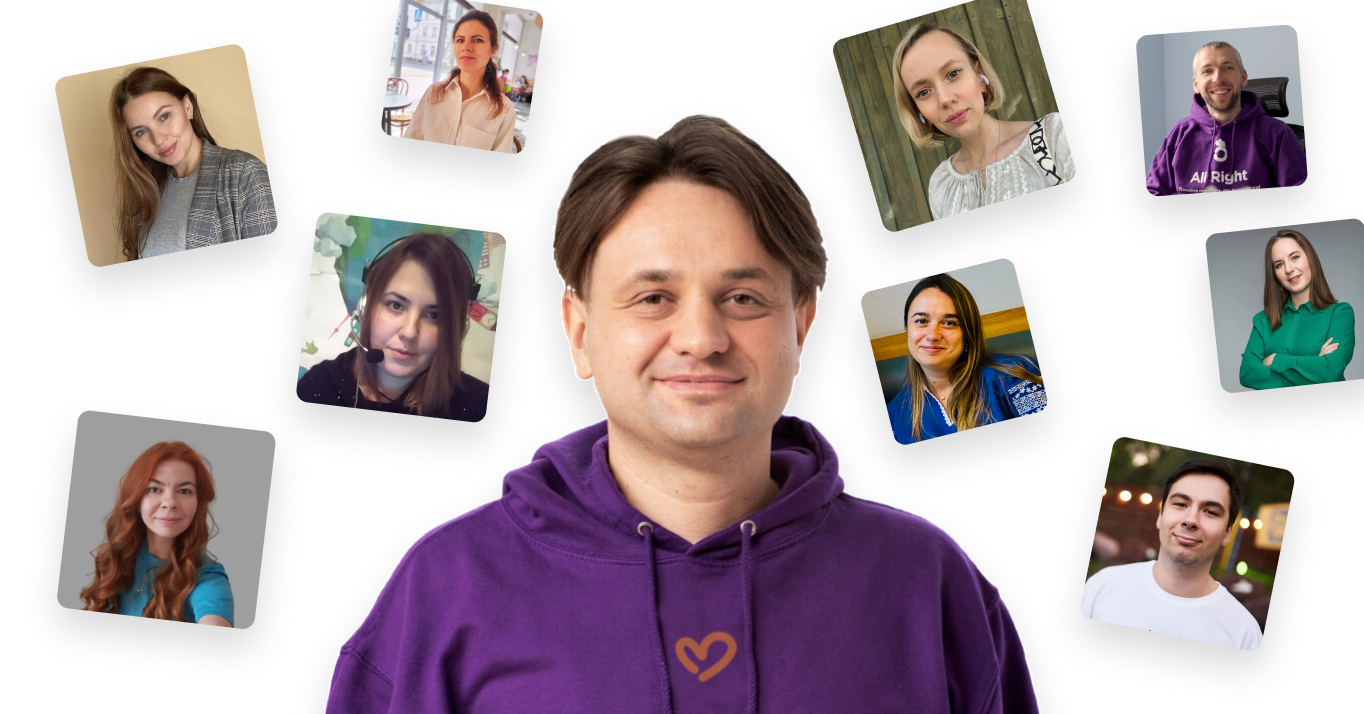Today, we have the incredible opportunity to talk to the founder of the school, Oleg Oksyuk, and find out how it all began.
Foundation and first steps
Even from school, we all remember the legend of the apple that fell on Newton's head.
– Oleg, what was that apple for you? How did the concept of starting an online English language school for children come about, especially since it's not the easiest or most profitable business?
– In any business, there are challenges, just as in any profession. But if you're doing something you love, you're ready for those challenges and overcome them with joy.
– Did you have any prior experience in education before founding the school?
– Before founding the school, I did not have direct experience in education. However, my 15 years of experience in the IT industry, including startup creation, provided me with valuable skills that I use in my educational endeavors.
– How did this specifically help in creating your own product?
– For example, I learned to adapt quickly to changes, work in a team, and effectively solve problems. I also have a deep understanding of how technology can be used to improve any field, including education, and together with the team, we actively strive to implement it into our product.
– How did the idea of creating the school come about?
– To be honest, I found learning English quite challenging. I wasn't interested in learning the language in school, and in university, the education followed a traditional approach focused solely on grammar and translation.
When I first found myself abroad, I realized that what I had learned was not quite the English spoken by native speakers. I felt uncomfortable communicating with them, as they couldn't understand me, and I couldn't understand them.
At that moment, I began searching for methods to help me learn the language at a high level. I started experimenting with various techniques and eventually found the one that worked for me. During the language learning process, I realized that I should have started learning English seriously in childhood rather than with the methods I was taught in school.
– Did this experience serve as the impetus for creating an online English language school?
– (Thinking) Yes and no. At age 34, I moved to the United States with my two children, who were 4 and 9 years old. Within six months of being in the USA, they spoke the language well.

This experience taught me that language learning should be natural and engaging. Children should communicate in the language within a living environment rather than just learning rules and memorizing words.
This is how the idea of creating a non-traditional school for children emerged, where they could learn English from a very young age and immerse themselves in an English-speaking environment.
– What did you start with? Learning about the transition from the idea to implementation would be interesting.
– Given my previous experience in creating my own product, I understood what I needed. As soon as I had the idea to open my own school, I began looking for teachers. On the Italki platform, I found 100 teachers who specifically taught children, and I selected 50 of them based on the following criteria:
Matching the teaching methodology I wanted to implement in my school.
Proficiency level in the English language.
Ability to communicate with children.
I enrolled in lessons with them to see how they taught and for them to assess my English proficiency. After interacting with them, I understood who would be the best fit for my team and offered them collaboration.
In particular, I was drawn to a charismatic guy from Australia who had a lot of experience teaching children, and a girl named Bobby from the United States, who was very creative and knew how to engage children in learning the language, along with a few other teachers.
– At the beginning, did you do everything yourself? How did the school's promotion happen?
– Actually, it was pretty easy. I created a landing page for the website and started advertising. My colleague handled phone calls from interested parents. We got 15 paying customers in the first month, which was a good sign for me. It gave me the understanding that my idea could work because parents were willing to invest in their children's future and understood the importance of language on their path. That's when I began actively working on promoting the idea.
– Did you immediately start thinking about forming a larger team?
– Yes, it all happened very quickly. About 2 months after the launch, I started looking for a team and contemplating the project's scalability. Now, we have around 200 employees, some of whom have been with us since the beginning of the school's creation. We teach children from 8 different countries, and our goal is to provide every child with the opportunity to learn English in a comfortable environment with the best teachers.
Building the team
Steve Jobs, known for his successful leadership at Apple, had an interesting approach to team recruitment and management. He said:
“It doesn't make sense to hire smart people and tell them what to do; we hire smart people, so they can tell us what to do.”
Many successful leaders and companies support this approach, as it fosters the creation of an innovative and self-sufficient team
– Do you support this principle? Do you have your own vision regarding this?
– Yes, I support it. However, when I conduct interviews, I pay attention to the following:
Whether a person shares the company's values.
How responsible and self-organized they are.
Their competence and attitude towards work.
– What ultimately plays a decisive role in the selection?
I would say that when I was just starting to work on building my own business, I immediately understood that for the success of an online school, I needed people who were not only experts in their field but also had a desire to grow and take on leadership roles in the future. Such individuals are more motivated and have a high level of ambition. They adapt to changes more quickly and can take responsibility for new projects.
For the online school to function smoothly, it was essential to divide responsibilities among departments and appoint managers responsible for the quality of each department's work. This improved collaboration among employees, increased efficiency, and ensured product quality.
Now, I can confidently say that I didn't make a mistake. The first managers of some departments are still working with me and helping me develop the product and expand into new markets. I'm delighted to have assembled such a fantastic team.
– Can't the principle of “the best of the best” lead to the loss of good employees who may not have the opportunity to take on leadership roles?
Firstly, holding a managerial position is not always necessary to fulfill oneself professionally. Some of our employees, who have no subordinates, are among the top 10% of most valuable employees in the company, and I believe they feel how much we value them. Secondly, the company continues to grow, and we have had cases of rapid career advancement over the past year or two.
– How would you describe the career growth system in the company? Is it a career ladder or an insurmountable cliff?
– (Smiling) It's definitely a career ladder, where individuals can quickly climb to new heights and achieve their professional and personal goals. In my opinion, our company offers excellent opportunities for career growth. I can proudly point to numerous examples of employees who started their journey in junior positions and now hold key leadership roles. Also, some employees have seen their salaries grow ten times in the 5-7 years they've been with the company.

We highly value employees willing to grow and contribute to the company's success, as finding such motivated professionals is a real challenge. We also sponsor various courses for professional development at the company's expense, so our employees can reach their goals and remain competitive in the job market.
Achievements and results in other countries
Over seven years, All Right has come a long way to become an influential international online school successfully operating in numerous countries worldwide. Let's hear from Oleg his thoughts on the achieved results and potential avenues for further development.
– You founded the school in one country. What happened next when you realized the need for expansion?
– We almost immediately began expanding our presence into new markets. Not all of them were successful, but today, we operate in 8 European countries: Poland, Ukraine, Italy, Spain, Romania, Czechia with Slovakia, Israel, and Germany. We adapted our product and services to the needs of each market, including localizing the platform interface, customer support, and sales in the language of each country.
– In which countries does the school operate today, and what are the plans for expansion?
– To be honest, from a short-term perspective, we do not plan to enter new markets. Our focus is on improving the quality of our products and services and expanding our business within these markets. We are increasing the number of teachers and clients to ensure the best possible experience for our users in these countries. (Pauses) What comes next, we will see in due time.
Plans for the future
Despite all our challenges, the belief in a better tomorrow remains unwavering. It is of utmost importance for our company to continue providing educational services to children from different European countries to improve the future of the younger generation.
– Please tell us about the company's plans for the future and further development. What are the goals and ambitions for the school's future growth?
– Our plans are always ambitious, but I try to be a realist and take things one step at a time. Over the 7 years of our school's existence, we have successfully educated 65,000 children. However, our primary goal remains reaching the milestone of 1 million students. And, as I've mentioned before, we are steadily working on increasing the number of teachers and clients. But when we reach that same milestone, it's hard to say for now.
Our team is actively improving the product—enhancing the methodology, the virtual classroom, and adding new features. Over the last year and a half, we have significantly improved our service and continue receiving positive feedback.
– What advice can you give to parents looking for the best way to teach their children English?
– I read a lot of advice then, and not all was effective. Based solely on my own experience, I would advise the following:
If you have children under 12 years, it is the best time to learn English. Children under adolescence have a different language learning mechanism than adults. If you choose the right teaching method, the learning mechanisms will be the same as when learning their native language. The child should find the learning process enjoyable, not just memorization but using the language and conversing in it.
– How can parents encourage a child to use English consistently, even if their level is beginner?
The main principle is practice. For example, you can encourage your child to speak English during family gatherings or play games that require the use of English. To help a child learn English better, it's important to surround them with the language. For instance, you can watch English-language cartoons and children's shows on YouTube or read English-language literature to your child. This will help the child become accustomed to the sound of English and learn to understand it.
Equally significant is communication with peers in English. You can enroll your child in an English-speaking camp or find English-speaking friends to communicate with online.
At All Right, for example, speaking clubs are included in the training cost. Such clubs help children find friends with similar interests and regularly practice English.
The success of All Right is the result of teamwork

Oleg Oksyuk, the school's founder, understood from the beginning that to achieve success, innovative teaching methods needed to be implemented, and a team of professionals who not only shared his values but also played a crucial role in achieving goals had to be formed.
Thanks to a well-selected team, Oleg managed to create a unique product that meets the needs of modern children. Today, All Right is a school that helps thousands of children fall in love with English through a playful approach and active immersion in an English-speaking environment. We are confident that All Right will continue to evolve and reach new heights.









